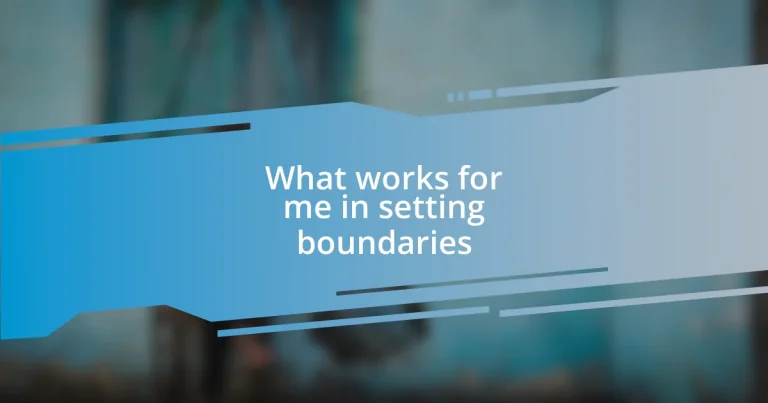Key takeaways:
- Understanding and communicating personal boundaries is essential for emotional well-being and maintaining healthy relationships.
- Setting clear boundaries prevents burnout, encourages respect, boosts self-esteem, and promotes effective communication.
- Reflecting on boundary experiences helps to identify patterns, reinforces self-awareness, and fosters personal growth through gratitude and self-reflection.
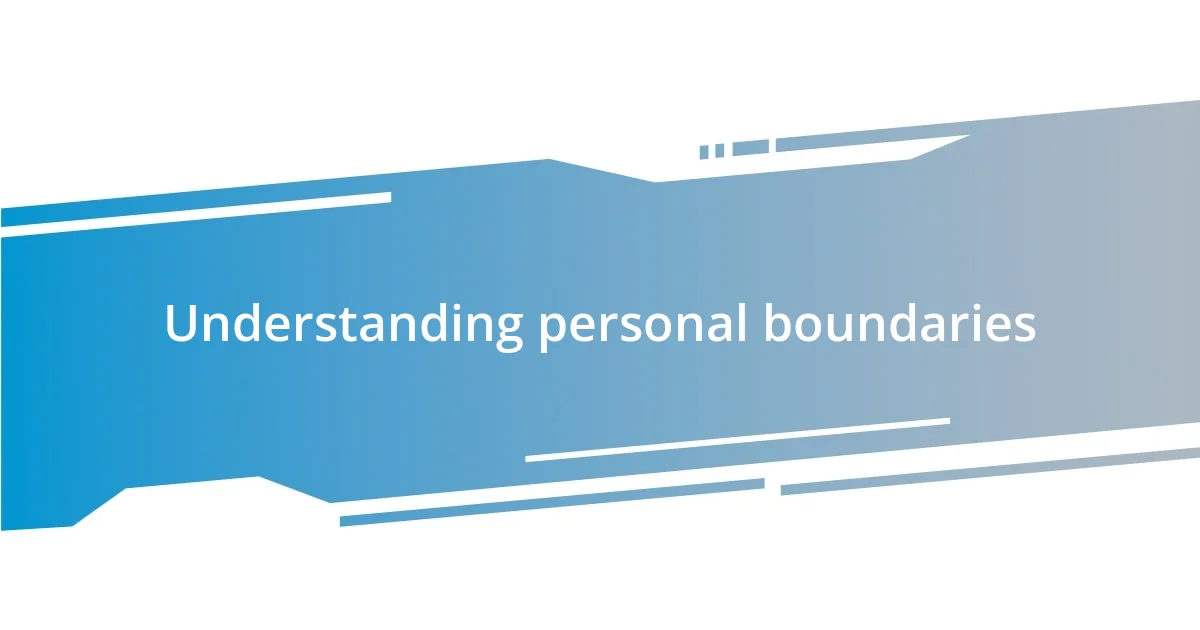
Understanding personal boundaries
Understanding personal boundaries is crucial for maintaining healthy relationships and ensuring our emotional well-being. I’ve often found myself in situations where I felt overwhelmed or taken for granted, simply because I hadn’t communicated my limits effectively. Have you ever felt uncomfortable saying “no” to someone? That feeling can stem from a lack of clearly defined boundaries.
One memorable instance I experienced was when a close friend began relying on me for every little issue, from personal problems to work-related tasks. I realized I was neglecting my own needs and goals to be there for them. It hit me: boundaries aren’t selfish; they’re essential for self-care. How do we honor our own needs while still being supportive? It’s about striking a balance.
I’ve come to recognize that personal boundaries can shift based on context, experience, and emotional state. In moments of stress, I’ve learned that it’s okay to reassess my limits and allow for flexibility. Have you thought about how your boundaries evolve over time? Reflecting on that can be quite revealing and transformative in understanding ourselves and our interactions with others.
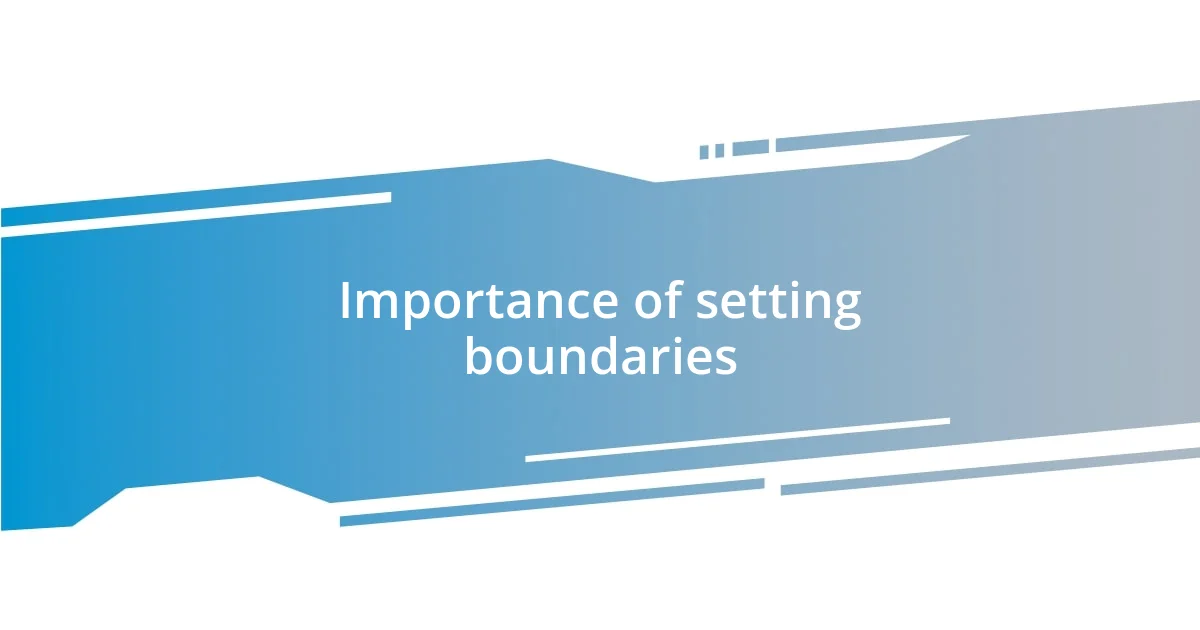
Importance of setting boundaries
Setting boundaries is essential for preserving our mental health and fostering meaningful connections. I’ve often noticed that when I establish clear limits, my relationships become more genuine. For instance, I once had a colleague who frequently called me after hours. Initially, I felt guilty for not being available, but once I set boundaries around my personal time, our interactions became more productive and respectful. It’s amazing how mutual understanding flourishes when we clearly communicate our needs.
Here are some key reasons why setting boundaries is so important:
- Prevents burnout: By not taking on more than I can handle, I maintain my energy and enthusiasm for both personal and professional pursuits.
- Encourages respect: When I articulate my limits, others recognize my value and autonomy, leading to healthier dynamics.
- Boosts self-esteem: Establishing boundaries reinforces my sense of self-worth and reminds me that my needs matter too.
- Promotes effective communication: When I share my limits, it sets the foundation for open discussions, allowing for better understanding and collaboration.
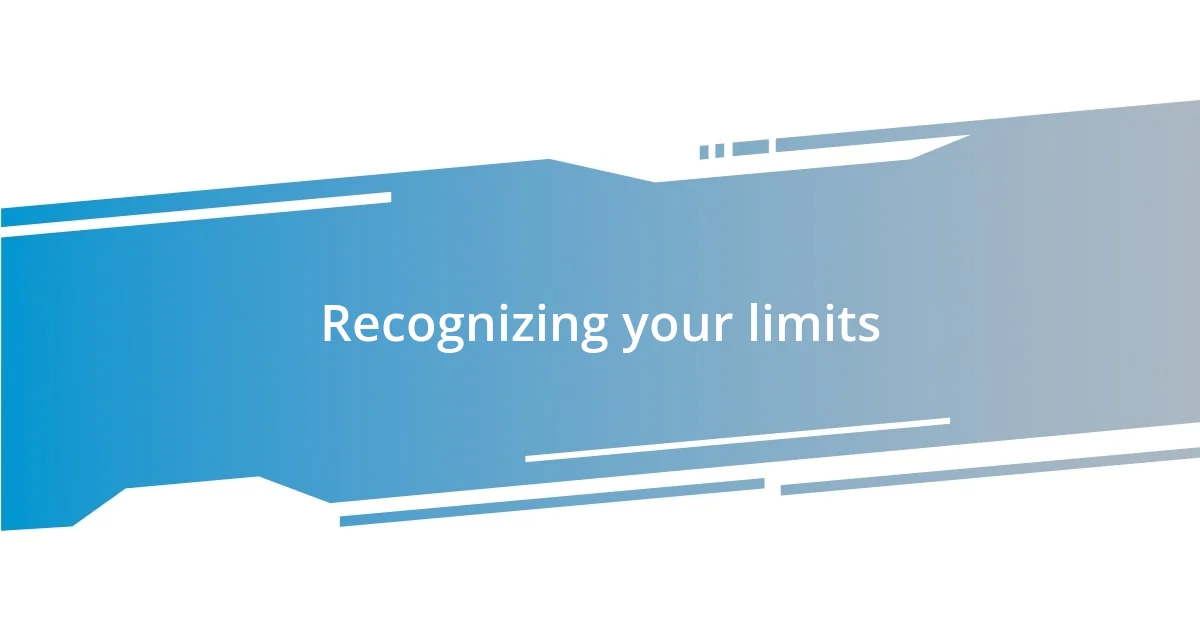
Recognizing your limits
Recognizing your limits is a journey that requires introspection. I remember a time when I felt stretched thin, saying “yes” to every request that came my way. It wasn’t until I missed a family event that I realized how important it is to listen to my own needs. I began to check in with myself more frequently—what do I truly have the capacity for right now?
As I’ve honed my ability to recognize my limits, I’ve found that tuning into my emotional state plays a significant role. There have been moments when I felt anxious or drained, signaling that it was time to reevaluate my commitments. I challenge you to consider: how do your emotions signal when it’s time to step back? Understanding these signs helps in maintaining not just personal wellbeing but also strengthens the relationships we cherish.
I’ve learned that it’s helpful to discuss these limits with those around me. Sharing my boundaries has nurtured deeper conversations and mutual respect, turning what once felt like selfishness into an act of self-awareness. Have you tried opening up about your limits? The clarity it brings is invaluable, fostering healthier connections and a more compassionate understanding of one another’s boundaries.
| Situation | Emotional Response |
|---|---|
| Overcommitted at work | Feeling overwhelmed and stressed |
| Ignoring personal time | Guilt from not being available |
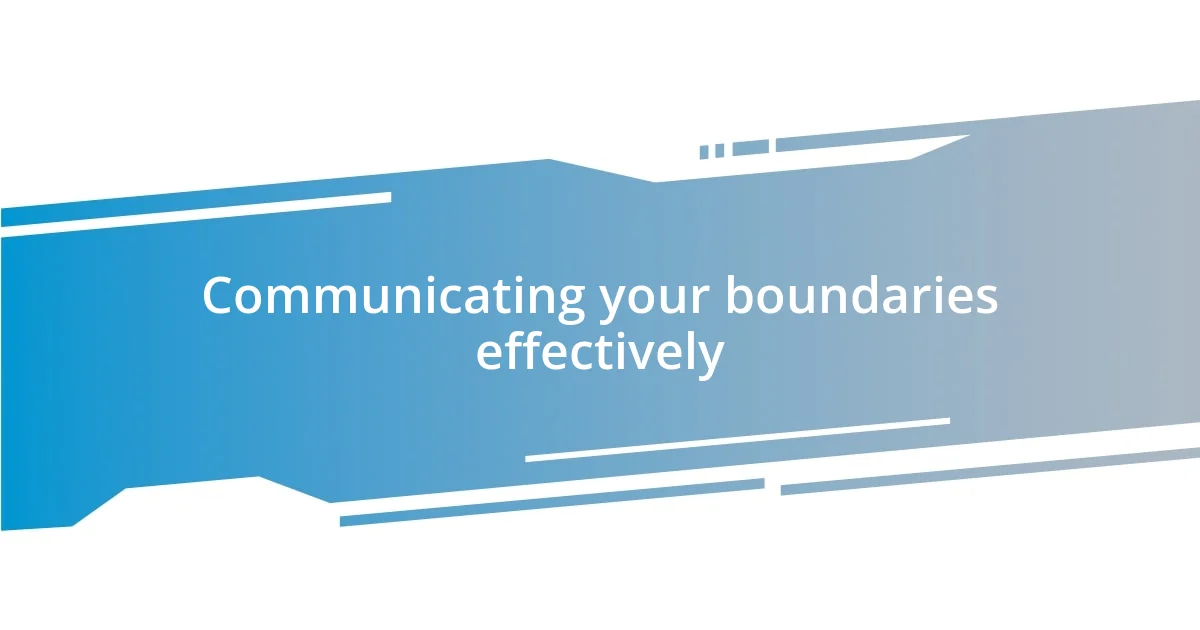
Communicating your boundaries effectively
When it comes to communicating boundaries, clarity is key. I remember a moment when I was hesitant to tell a friend that I needed some quiet time each evening. I worried about disappointing her, but when I finally expressed my need, it opened up a much deeper conversation about personal space. Have you ever hesitated to share your needs? What I found is that honesty can transform discomfort into understanding, creating a safe space for both parties.
I’ve learned that the tone and timing of a conversation can significantly affect how boundaries are received. One evening, during a casual dinner, I shared my limited availability for weekend plans. Instead of springing it on her last minute, I chose a relaxed setting, which made the dialogue feel more like a collaboration than a confrontation. Have you noticed how the environment can influence communication? It’s fascinating how a friendly atmosphere invites constructive dialogue and helps others absorb your message better.
Respectfully reiterating your boundaries is also crucial. There have been times when I’ve had to remind coworkers of my “no calls after 6 PM” policy. Initially, it felt awkward, but each time I reaffirmed my limits, I noticed a shift in our interactions. They began to respect my time more, leading to better collaboration during work hours. When you revisit your boundaries regularly, it reinforces their importance—not just for you, but for those around you. So, how do you keep your boundaries fresh in others’ minds?
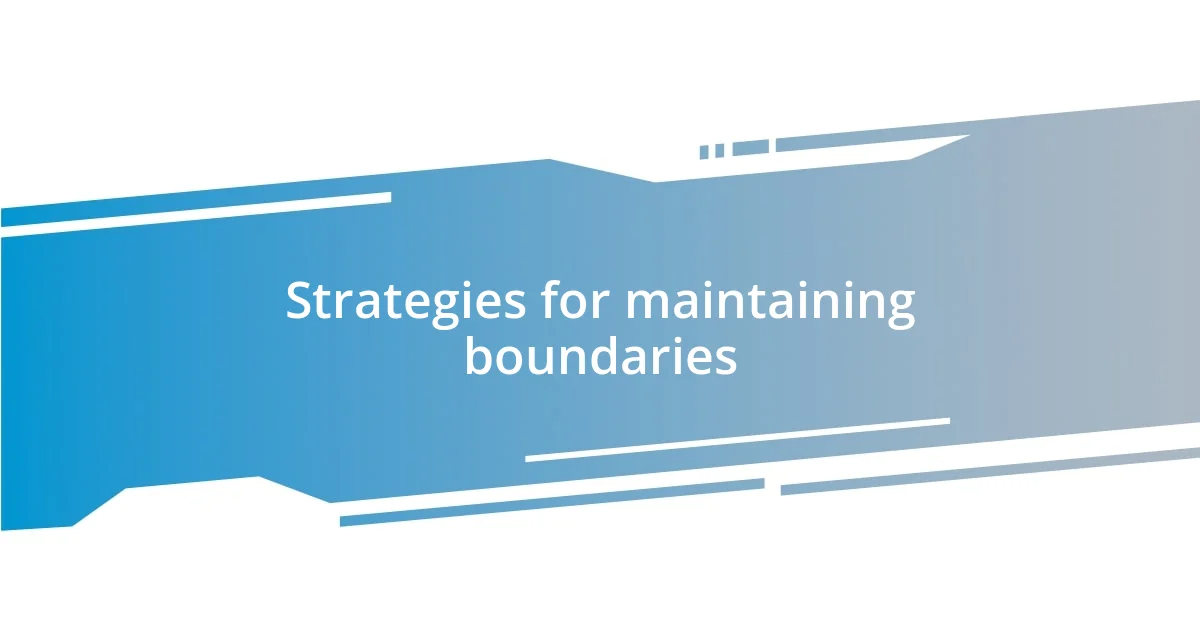
Strategies for maintaining boundaries
Maintaining boundaries sometimes requires proactive strategies that keep our limits visible. I once started using a digital calendar to block out personal time amidst work meetings and social commitments. At first, it felt strange to prioritize my own needs in a shared space, but seeing my time marked as “busy” helped me not only stick to my boundaries but also reminded others of their importance. Have you tried leveraging technology to safeguard your time?
Creating visual reminders can also be a game changer. I painted a small canvas with the phrase “My time matters” and hung it in my workspace. Every time I glance at it, I’m reminded to pause and reflect before saying yes to new obligations. This small act infuses my environment with affirmation and reinforces my commitment to self-care. Have you considered what physical symbols might serve as personal reminders for your own boundaries?
Another effective strategy involves establishing regular check-ins with oneself—an intentional timeout to evaluate how I’m feeling about my commitments. I find that dedicating a few moments at the end of each week helps me assess whether my emotional and energy levels align with my activities. There was a time I overlooked this practice, and it cost me dearly in burnout. Now, I make it a priority to ask myself: “Is this still serving me?” It’s a simple yet profound way to ensure my boundaries remain intact and respected.
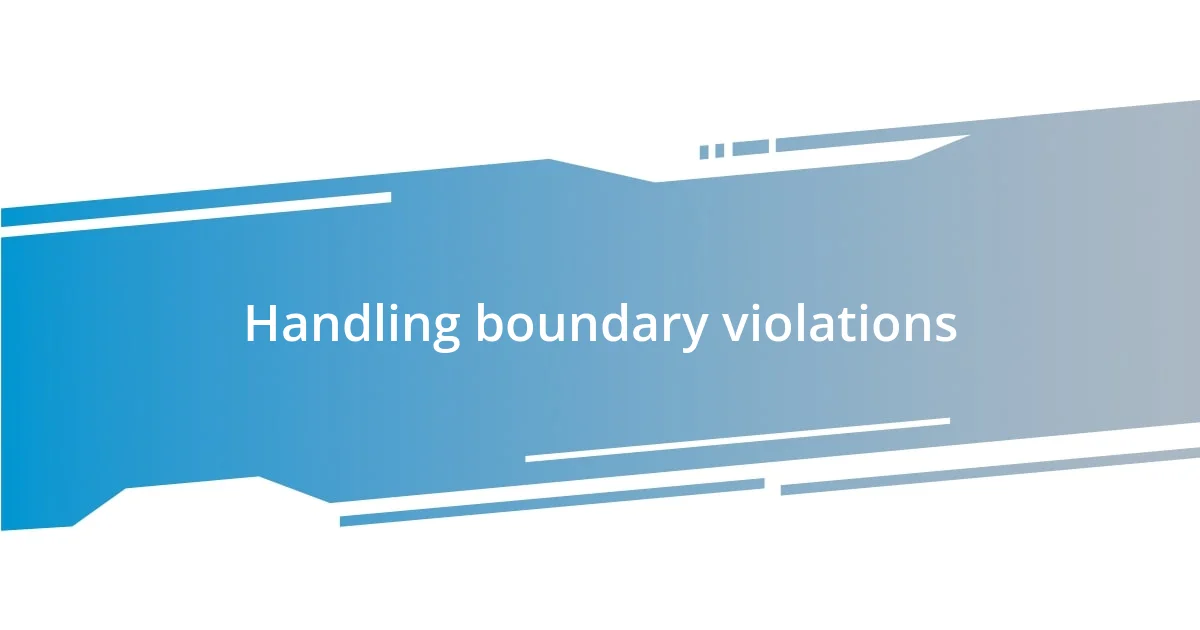
Handling boundary violations
When someone crosses a boundary I’ve set, I feel a wave of frustration. I recall an incident when a colleague repeatedly interrupted my lunch breaks for work discussions, ignoring my request for uninterrupted time. It took me a while to muster the courage to address this directly, but once I did, I felt a sense of relief. Have you ever felt that weight lift after confronting someone about a boundary violation? My experience taught me that open communication can reclaim our space and help others understand the importance of respecting our limits.
It’s important to recognize that boundary violations can often stem from misunderstandings. I remember a friend who didn’t realize how her constant texting during my downtime impacted me. When I finally decided to explain that I needed those moments to recharge, she was genuinely surprised. This experience made me realize that sometimes, people are simply unaware of how their actions affect us. Have you found that educating others about your boundaries can lead to more respectful interactions? I learned that patience and empathy are essential in these conversations—transforming frustration into understanding can strengthen relationships.
In moments when boundaries are repeatedly disrespected, I turn to self-care as a vital tool. After dealing with a family member who continued to encroach on my personal time, I found solace in journaling my feelings. Writing allowed me to process my emotions and strategize the next steps for handling the situation. Have you ever found clarity through writing? This reflection empowered me to reinforce my boundaries with confidence, ensuring that I prioritized my well-being amidst the chaos of boundary violations.
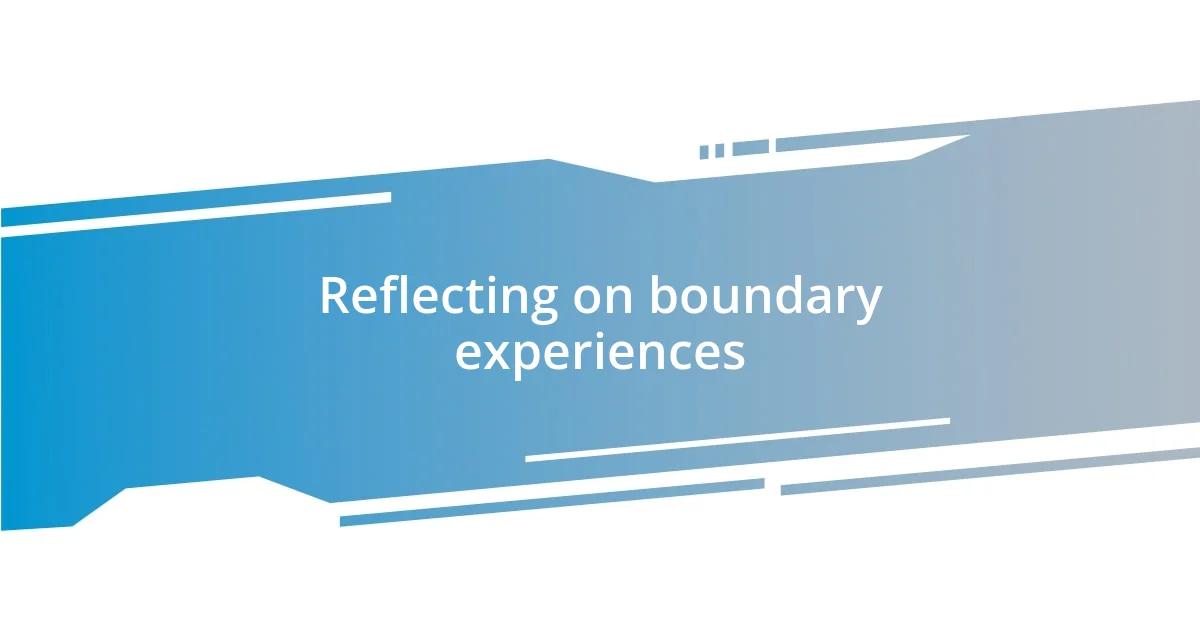
Reflecting on boundary experiences
Reflecting on my boundary experiences has often been a bittersweet journey. I vividly recall a time when I hesitated to speak up about my limits with a close friend. At first, I didn’t want to hurt their feelings, but over time, the inner conflict became exhausting. Looking back, I wish I had realized sooner that sharing my needs was not only vital for my well-being but also helped strengthen our relationship. Have you found yourself in a similar situation, torn between caring for others and honoring your own needs?
There are moments when reflection reveals patterns that I hadn’t noticed before. One time, I took a step back to think about why I kept feeling overwhelmed at work. It hit me that I consistently said yes to additional responsibilities despite already feeling stretched thin. This realization was eye-opening; I learned that it’s okay to say no and that doing so is a necessary act of self-compassion. Have you ever reflected on your choices and discovered underlying themes about your boundaries?
On several occasions, I’ve also embraced the power of gratitude in reflecting on my boundary-setting journey. When I’ve successfully communicated my limits, I take a moment to celebrate that achievement. A small gratitude journal, where I jot down these instances, reminds me of my progress. It transforms what can feel like a daunting task into a series of victories. Isn’t it amazing how acknowledging our own growth can motivate us to keep pursuing healthier boundaries?












